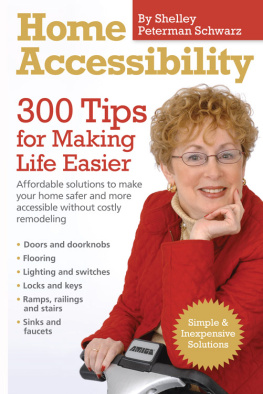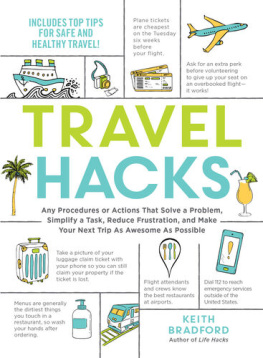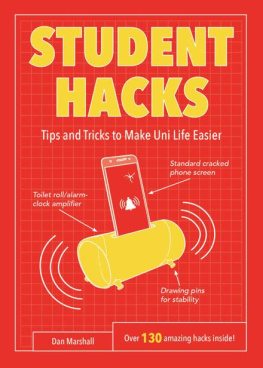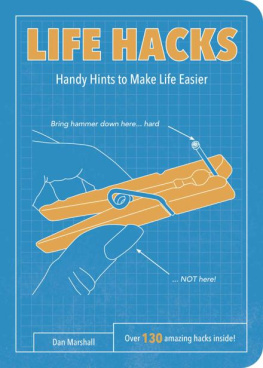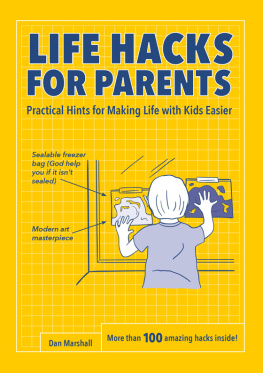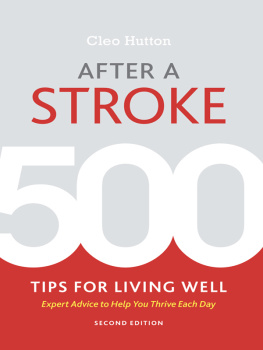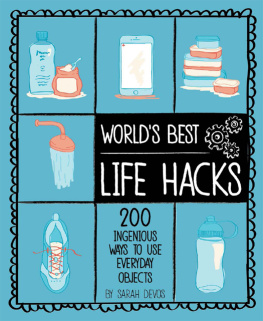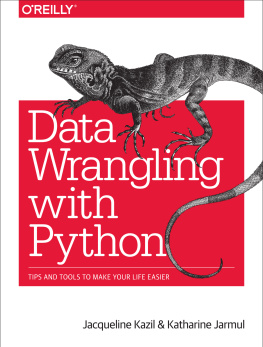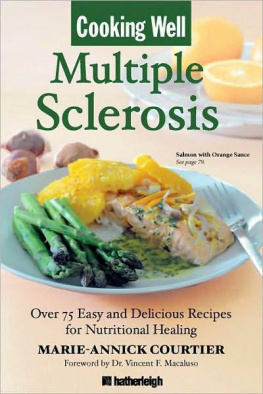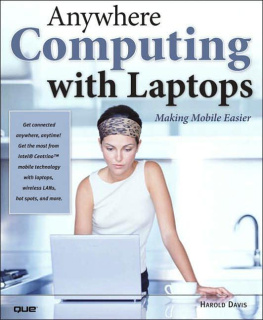Shelley Peterman Schwarz - Home Accessibility: 300 Tips For Making Life Easier
Here you can read online Shelley Peterman Schwarz - Home Accessibility: 300 Tips For Making Life Easier full text of the book (entire story) in english for free. Download pdf and epub, get meaning, cover and reviews about this ebook. year: 2011, publisher: Springer Publishing Company, genre: Home and family. Description of the work, (preface) as well as reviews are available. Best literature library LitArk.com created for fans of good reading and offers a wide selection of genres:
Romance novel
Science fiction
Adventure
Detective
Science
History
Home and family
Prose
Art
Politics
Computer
Non-fiction
Religion
Business
Children
Humor
Choose a favorite category and find really read worthwhile books. Enjoy immersion in the world of imagination, feel the emotions of the characters or learn something new for yourself, make an fascinating discovery.
- Book:Home Accessibility: 300 Tips For Making Life Easier
- Author:
- Publisher:Springer Publishing Company
- Genre:
- Year:2011
- Rating:4 / 5
- Favourites:Add to favourites
- Your mark:
- 80
- 1
- 2
- 3
- 4
- 5
Home Accessibility: 300 Tips For Making Life Easier: summary, description and annotation
We offer to read an annotation, description, summary or preface (depends on what the author of the book "Home Accessibility: 300 Tips For Making Life Easier" wrote himself). If you haven't found the necessary information about the book — write in the comments, we will try to find it.
Written by the best-selling author of Multiple Sclerosis: 300 Tips for Making Life Easier and Parkinsons Disease: 300 Tips for Making Life Easier
Home Accessibility: 300 Tips For Making Life Easier — read online for free the complete book (whole text) full work
Below is the text of the book, divided by pages. System saving the place of the last page read, allows you to conveniently read the book "Home Accessibility: 300 Tips For Making Life Easier" online for free, without having to search again every time where you left off. Put a bookmark, and you can go to the page where you finished reading at any time.
Font size:
Interval:
Bookmark:

Visit our website at www.demoshealth.com
ISBN: 978-1-936303-22-9
ebook ISBN: 978-1-617050-86-2
Acquisitions Editor: Noreen Henson
Compositor: Techset
2012 by Shelley Peterman Schwarz. All rights reserved. This book is protected by copyright. No part of it may be reproduced, stored in a retrieval system, or transmitted in any form or by any means, electronic, mechanical, photocopying, recording, or otherwise, without the prior written permission of the publisher.
Medical information provided by Demos Health, in the absence of a visit with a healthcare professional, must be considered as an educational service only. This book is not designed to replace a physicians independent judgment about the appropriateness or risks of a procedure of therapy for a given patient. Our purpose is to provide you with information that will help you make your own healthcare decisions.
The information and opinions provided here are believed to be accurate and sound, based on the best judgment available to the authors, editors, and publisher, but readers who fail to consult appropriate health authorities assume the risk of injuries. The publisher is not responsible for errors or omissions. The editors and publisher welcome any reader to report to the publisher any discrepancies or inaccuracies noticed.
Library of Congress Cataloging-in-Publication Data
CIP data is available from the Library of Congress.
Special discounts on bulk quantities of Demos Health books are available to corporations, professional associations, pharmaceutical companies, healthcare organizations, and other qualifying groups. For details, please contact:
Special Sales Department
Demos Medical Publishing
11 West 42nd Street, 15th Floor
New York, NY 10036
Phone: 800-532-8663 or 212-683-0072
Fax: 212-941-7842
E-mail:
Printed in the United States of America by Hamilton Printing.
11 12 13 14/5 4 3 2 1
A Special Thank You
For over 9 years, I have had the best assistant and colleague to work withDeborah Proctor. I know that it is only because of her many talents and skills that we have been able to tackle projects, large and small, and are now poised for even greater things in the future.
Deborah, you are an extraordinary researcher, writer, organizer, editor, idea generator, and marketing and overall project manager. As with so many things, I could not have written this book without you.
Thank you for all you do to make my life easier!
W hether blindsided by an unforeseen injury or illness or slowly robbed of strength by the insidious ravages of old age, there will come a time for us all when we are rendered disabled and struggling or even unable to do for ourselves that which we previously took for granted. It is for these times that Home Accessibility: 300 Tips for Making Life Easier is of value; it will transform the reader from a victim to an empowered advocate.
My introduction to disability came at 4 years of age when my best friends mother was diagnosed and bed-ridden with a progressive form of multiple sclerosis. At the time, I didnt really understand all the implications her disability had on her children, marriage, career, self-esteem, indeed her whole life. Over the years, I came to better appreciate how her disability shaped her environmentthe homemade wooden ramp leading to the front door, the scooter she drove around the house, and the lift-equipped van she used to get around towneach of these adaptations allowed her to participate more with her family and rely less on others.
Despite my enlightened childhood, never did the concepts of disability and accessibility become more meaningful to me than three weeks before I was supposed to start medical school. In the blink of an eye, a roll-over car accident left me with a broken neck and rendered me quadriplegic. Robbed of my strength and independence, my dream of becoming a physician was threatened. I learned quickly that in order to get my life back on track I would not only have to undergo extensive rehabilitation therapies, but that adapting my environment was the key to achieving my dreams.
Twelve years later, I still call upon those early childhood lessons to not only maintain my independence, but also to empower my patients. Perhaps this is why I am so pleased to see this book come to market and why I am honored to write the foreword for this amazing book. May readers find within these pages the key to unlocking their potential and maximizing their independence.
Jonathan D. Myers, MD
Board Certified in Physical Medicine & Rehabilitation
Medical Director of Rehabilitation Services
St. Lukes Magic Valley Regional Medical Center
Twin Falls, ID
I have been very excited about writing Home Accessibility: 300 Tips for Making Life Easier. After living with multiple sclerosis (MS) for more than 30 years and using an Amigo three-wheeled scooter-style wheelchair for more than 25 years, I have learned a lot about making ones home safe and accessible. I have learned many of the tips through personal experience; others from friends, acquaintances, and the physical and occupational therapists who have helped me adjust and adapt to increasing disability.
In this book I have tried to present options for all budgets. Some of the suggestions I offer include no cost, using items you already have around your house. Others are of relatively low cost, less than $100. The information on Universal Design (UD) and more involved remodeling modifications is presented for those who have larger budgets or want to understand what makes a dwelling accessible. One of the primary resources I used to research this book was the Center for Universal Design (College of Design; North Carolina State University; Campus Box 8613; Raleigh, NC 27695-8613; Phone: 919-513-0825; www.design.ncsu.edu/cud). Their online guide Residential, Rehabilitation, Remodeling, and Universal Design is a valuable aid to anyone who needs to make modifications to accommodate physical limitations.
Whether you are recovering from surgery or an accident, living with a chronic illness or disability, or simply feeling the effects of your age (or know someone who is), my hope is that this book will help you find simple, cost-conscious solutions to keep you safe and independent in your home. And, in the process of reading this book, I hope you will discover tips, techniques, and timesavers that will make you say, Thats so simple! Why didnt I think of that?
If you have a tip or product recommendation to share, I would love to learn about it. Visit .
Wishing you all the best.
Shelley
Follow Shelley on Twitter (ShelleyPSchwarz)
and Facebook (Shelley Peterman Schwarz)
I would like to thank the following people and organizations (in no specific order) who freely gave their time and knowledge educating me on specific needs of people with various disabilities different from my own. Without them this book would not have been possible.
Linda Lane and Pattie Dorn, Independent Living, Inc.; Dee Truhn and Belinda Richardson, Access to Independence; Susan Buzby and Regan Jacobsen, projecthome; Marshall Flax and Jean Kalscheur, Wisconsin Council of the Blind and Visually Impaired; Ellen McGinn, Meriter Hospital; Kelly Rehbeck, Center for Communication, Hearing, and DeafnessUniversaLink; Amy Wurf, Veterans Administration; Larry Taff, TZ of Madison; Jim Klassy, Klassey, Inc.; Jeff Kichefski, Home Accessibility; Ruth Farrington, Marling Homeworks; Martine Davis, Indoor Environmental Testing Inc.; Rosemarie Rossetti, Universal Design Living Laboratory; and last but not least my wonderfully supportive friends and colleaguesJudy Ross, Carol Burns, Lisa Krosinski, and everyone else who has shared their tips and strategies for making life easier with me.
Font size:
Interval:
Bookmark:
Similar books «Home Accessibility: 300 Tips For Making Life Easier»
Look at similar books to Home Accessibility: 300 Tips For Making Life Easier. We have selected literature similar in name and meaning in the hope of providing readers with more options to find new, interesting, not yet read works.
Discussion, reviews of the book Home Accessibility: 300 Tips For Making Life Easier and just readers' own opinions. Leave your comments, write what you think about the work, its meaning or the main characters. Specify what exactly you liked and what you didn't like, and why you think so.

